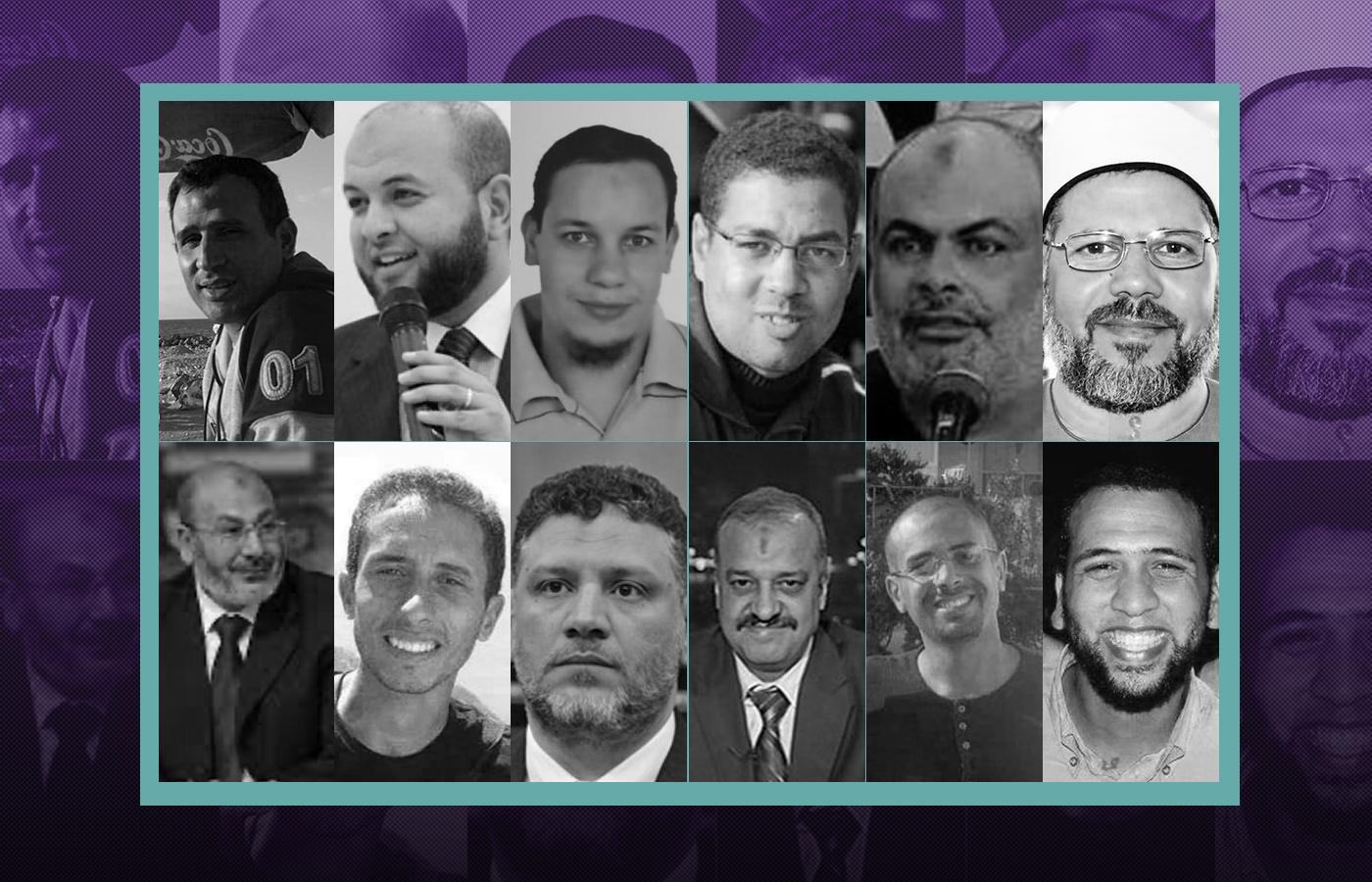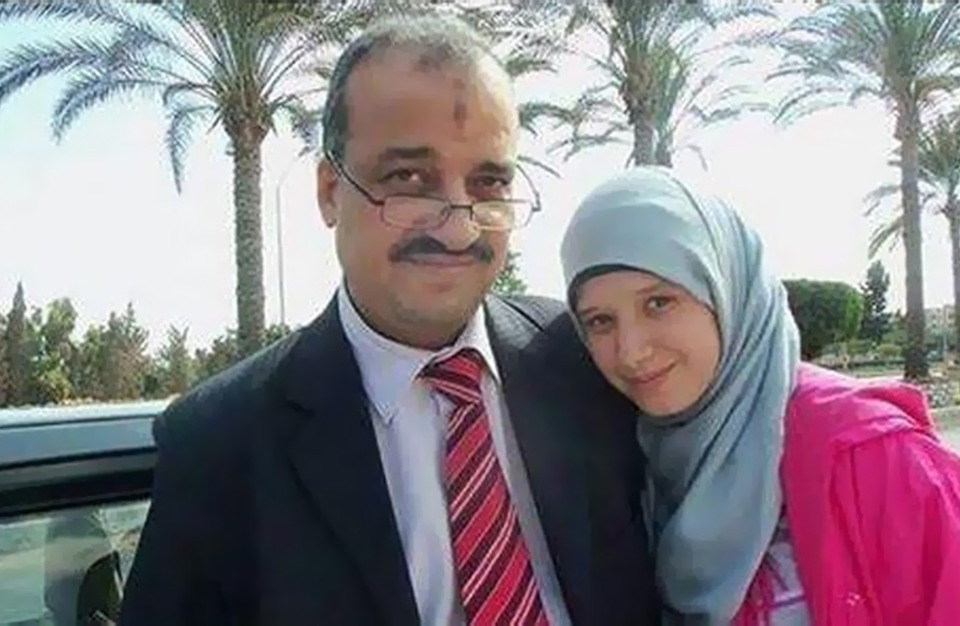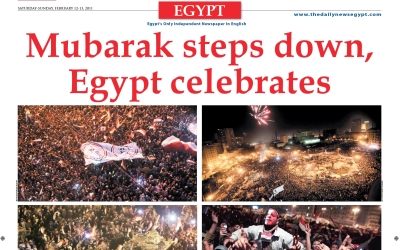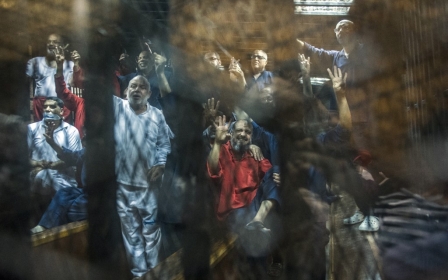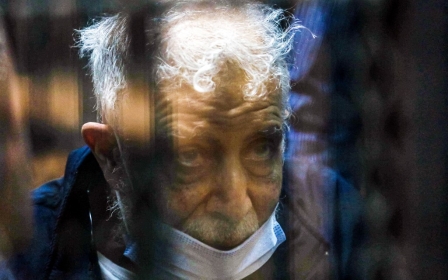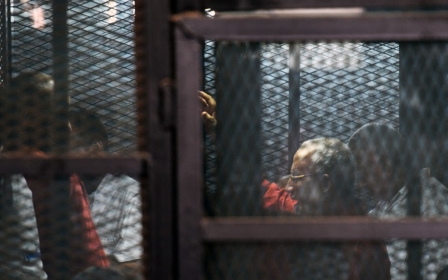Egypt: Families of Muslim Brotherhood figures fear executions 'at any moment'
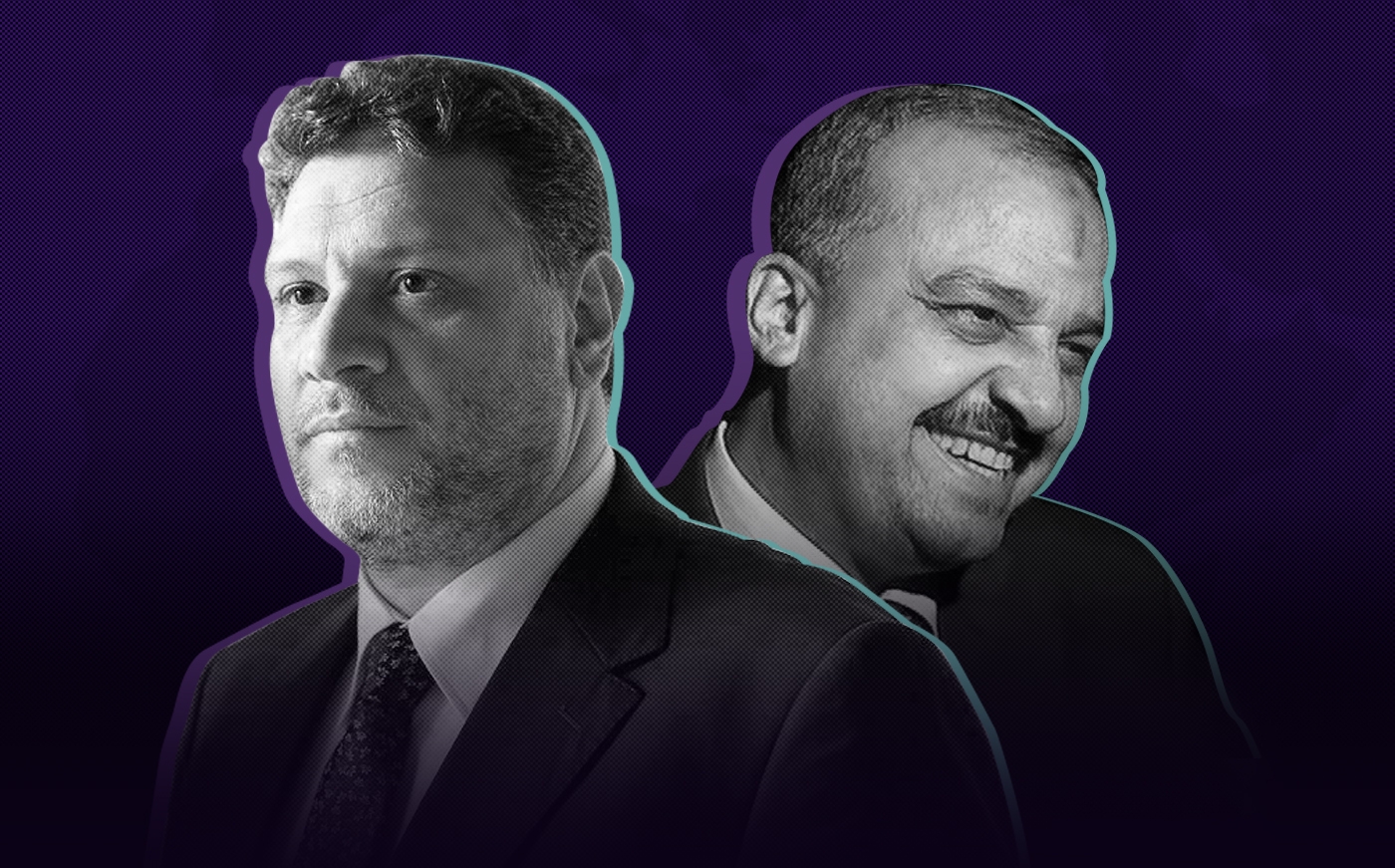
The families of two Muslim Brotherhood politicians on death row in Egypt say they are living in fear, as the executions may be carried out imminently if no presidential pardon is issued by the end of June.
"We are in constant fear," Sanaa Abdelgawad, the wife of former member of parliament Mohamed el-Beltagy, told Middle East Eye.
"After the death penalty has been upheld, the execution can take place at any moment."
On 14 June, Egypt's highest appeals court upheld the death sentences issued against Beltagy and 11 other opponents of the government of President Abdel Fattah el-Sisi, paving the way for their potential execution. The country's criminal procedure code gives the president 14 days following the court ruling to pardon the defendants or commute the death sentences.
'I never imagined that the victim, my husband, would be sentenced to death, while the killer would be left at large'
- Sanaa Abdelgawad, wife of Mohamed el-Beltagy
Those on death row include a number of outspoken political figures who held leading roles in the 2011 uprising against longtime ruler Hosni Mubarak, as well as in the demonstrations against the 2013 coup that deposed Mohamed Morsi, Egypt's first democratically elected president.
New MEE newsletter: Jerusalem Dispatch
Sign up to get the latest insights and analysis on Israel-Palestine, alongside Turkey Unpacked and other MEE newsletters
The Muslim Brotherhood held power for nearly a year under Morsi's leadership before he was ousted by Sisi.
The leading Brotherhood figures on death row also include the Morsi-era minister of youth, Osama Yassin, and the Brotherhood's former media spokesman, Ahmed Aref.
The court decision marks an end to a mass trial that began in December 2015, in which 739 defendants were charged with being involved in the 2013 Rabaa Square sit-in protest against Morsi's overthrow.
The crackdown by Egyptian security forces on the sit-in on 14 August 2013 has been described by Human Rights Watch as the "worst single-day killing of protesters in modern history," with at least 800 people killed.
Morsi, meanwhile, died of a heart attack during a court session in June 2019. UN experts said the conditions in which the Muslim Brotherhood leader had been imprisoned may have directly led to his death, amounting to a "state-sanctioned killing".
Who are the 12 people at risk of execution in Egypt?
+ Show - HideOn 14 June, Egypt's highest appeals court upheld the death sentences issued against Beltagy and 11 other opponents of the government of President Abdel Fattah el-Sisi, paving the way for their potential execution. The country’s criminal procedure code gives the president 14 days following the court ruling to pardon the defendants or commute the death sentences.
Abdelazim Attia, Ahmed Aref, Ehab Wagdy Mohamed, Ahmed Farouk Kamel Mohamad, Mohamed Zanati, Abdelrahman el-Barr, Safwat Hegazy, Mostafa El-Faramawy, Osama Yassin, Mohamed el-Beltagy, Mohammed El-Faramawy and Haitham Sayed el-Araby (MEE/Illustration by Hossam Sarhan)
So who are the 12 men currently facing the threat of imminent execution?
Mohamed el-Beltagy
The former general secretary of the Muslim Brotherhood, Mohamed el-Beltagy was a physician and lecturer at Cairo University's medical school. He was elected as a member of parliament in 2005 and 2012. He is a 58-year-old father of five.
His daughter, 17-year-old Asmaa el-Beltagy, was among the hundreds of protesters killed in the violent dispersal of the Rabaa square sit-in on 14 August 2013. His son Anas el-Beltagy has been held in pre-trial detention in solitary confinement for seven years.
Beltagy was arrested on 29 August 2013. He has repeatedly complained of medical negligence while in prison, including when he suffered a stroke two years ago and was not granted the follow-up care recommended by the prison physician.
Beltagy was arguably the most outspoken Brotherhood member during the reign of longtime autocrat Hosni Mubarak. Under Mubarak's rule, he was elected twice as a member of parliament for the Shubra el-Kheima constituency.
Even though the Brotherhood was accused of not taking part in the early days of the 2011 anti-Mubarak protests, Beltagy was among those who were present from day one. On 25 January 2011, he took part in a protest against police brutality in front of the High Judicial Council in Cairo's Ramsis street, alongside fellow members of the Kefaya movement.
He was also a pro-Palestine activist, and was among those on board the MV Mavi Marmara during the 2010 Gaza flotilla raid.
Osama Yassin
Osama Yassin, 56, is a physician and served as minister for youth in ousted president Mohamed Morsi's government.
During the 2011 uprising, Yassin was the Brotherhood's protest coordinator, playing a central role in the mobilisation that culminated in Mubarak's removal from power. He was detained on 26 August 2013 in the wake of the crackdown on the Rabaa sit-in.
In a speech before the court in May 2016, Yassin said that the reason for his prosecution was his role in the revolution. "My offence is taking part in the 25 January revolution as one of its leading figures," he said.
"The objective of these trials is to turn those who had a leading role in the revolution into examples for others to deter the people from another revolution," he told the judge. "The victims of Rabaa are the ones standing trial, while the real culprits in spilling blood are at large."
Ahmed Aref
Born in Kuwait on 25 December 1981, Aref is a dentist by training, and the former media spokesman of the Muslim Brotherhood.
He is a graduate of Ain Shams University's dental school, and was a leader within Egypt's union of dentists.
Aref was arrested in his home on 22 August 2013, one week after the dispersal at Rabaa. He has been under trial in two cases linked to the sit-in. He was sentenced to five years in prison in the first case, dubbed "the Rabaa operations room". He was simultaneously added to the second Rabaa case, in which he was handed a death sentence.
"This sentence, like hundreds issued since the coup, is politically motivated and unjust. The trials aim at one thing: retaliation for those who participated in the 25 January revolution," his father said.
Aref's family have said that they have been barred from visiting him in prison for more than three years.
Abdelrahman el-Barr
Abdelrahman el-Barr, 58, is a professor of Islamic Studies at Al-Azhar University and served as a member of the Guidance Bureau of the Muslim Brotherhood.
His brother said that the family, including his five children, has been barred from visiting him in prison for the past three years.
"We know nothing about him or his health condition," he said. "We don't even know where or in what conditions he is held."
Abdelazim Ibrahim Mohamed Attia
Attia is a 46-year-old physician. He was arrested on 24 July 2013, when security forces raided his workplace in Cairo to arrest the company’s director, Mohamed al-Zanati. When Attia asked the plainclothes officers on what basis they were arresting Zanati, they arrested him as well, with a police officer reportedly saying: “Let’s take him too, this case requires another accused.”
He is a father to two girls, Mariam, 13, and Sarah, 11.
Attia said he was subjected to numerous forms of torture in detention, including electric shocks, beatings, being dragged on the ground and suspended in the air.
Mohamed Mahmoud Ali al-Zanati
Mohamed Mahmoud Ali al-Zanati is a 61-year-old physician. He was detained on 24 July 2013.
Ehab Wagdy Mohamed
Ehab Wagdy, 37, is a software engineer. He was arrested on 14 August 2013 in the vicinity of Rabaa Square.
Safwat Hegazy
Safwat Hegazy, 56, is a Salafi television host and preacher. He was arrested on 21 August 2013. Even though he was not affiliated with the Brotherhood, he was among the most prominent opponents of the coup against Morsi.
Ahmed Farouk Kamel Mohamad
The 37-year-old lawyer was arrested on 15 July 2013 in what became known as “the finger case”. Mohamad was accused of torturing a person and cutting off his finger - a claim the victim later admitted was false.
Mohamad was sentenced to three years in prison - but while serving the sentence, he was added to the Rabaa mass trial, despite having already been in prison prior to the sit-in's dispersal.
Haitham Sayed el-Araby
El-Araby, 36, is a civil engineer. He was arrested on 15 July 2013 when he tried to help a wounded protester while driving on Cairo's ring road. He is the father of a 10-year-old boy and an 8-year-old girl.
Mohammed Abdelhay el-Faramawy
Mohamed el-Faramawy is one of two siblings arrested on 15 July 2013 in connection with the “finger case”. The 40-year-old teacher was arrested while trying to assist a wounded protester. He is the father of an eight-year-old boy.
Mostafa Abdelhay el-Faramawy
Mostafa el-Faramawy was arrested alongside his brother on 15 July 2013. He is 30-years old and worked as a computer engineer prior to his detention.
The death sentences have triggered an outcry by international rights groups, which have said the trial has been marred by violations of due process from its outset - all while security forces behind the Rabaa massacre have yet to face accountability.
Human Rights Watch described the sentences as "a mockery of justice," while Amnesty International said they were "a stain on the reputation of Egypt's highest appeals court and cast a dark shadow over the country's entire justice system".
In 2020, the number of executions in Egypt tripled from the year before, making the country the third-most prolific executioner after China and Iran.
Many of those executed have been described by rights groups as "prisoners of conscience" detained over their opposition to the Sisi government.
According to the Geneva-based Committee for Justice rights group, at least 92 Sisi opponents have been executed since 2013, and final death sentences have been issued for 64 others who may be executed at any moment.
However, if the death penalty against the 12 Brotherhood leaders is carried out, it would be the first time under Sisi's rule that well-known opposition figures are executed.
While the Brotherhood's Freedom and Justice Party had the largest popular backing in the 2012 elections, the coup effectively erased the group from Egyptian political life. Since then, the party has been dissolved and the Brotherhood declared a terrorist organisation. Thousands of its members and supporters have been either jailed, killed, or forced to live in exile.
Reversed justice
It was only two weeks after the death of her daughter, killed during the Rabaa massacre, that Abdelgawad, 53, heard about her husband's arrest.
"Life became extremely hard," she told MEE from Istanbul, where she has been living in exile. "I lost my only daughter, then her father was taken from me by an unjust incarceration. I thought the injustice was only temporary, but I was devastated when my sons were detained, one after another."
Abdelgawad's son Anas remains in pre-trial detention for the seventh year in a row. Her other three sons, Ammar, Khaled and Hossam, live with her in exile.
She believes her husband's trial and death sentence amount to prosecuting the victims of the Rabaa massacre, while the culprits have yet to be held accountable.
"I never imagined that the victim, my husband, would be sentenced to death, while the killer would be left at large," she said. "But under military rule, violations of the law and human rights have become the norm."
The last time Abdelgawad saw her husband was five-and-a-half years ago. She says he has been held in solitary confinement since his arrest, barred from family visits for most of his detention, and stripped of access to medication, books, and exercise.
"My husband was a member of parliament and a member of the National Council for Human Rights," she said. "He used to defend victims of injustice. He was also a professor of ear, nose and throat surgery at Al-Azhar University. He had a medical centre where he provided his services to patients, many of them he treated free of charge."
In addition to being a member of parliament, Beltagy was thought of as an activist by many. Even though the Brotherhood was accused of not taking part in the early days of the 2011 anti-Mubarak protests, Beltagy was among those who were present from day one. On 25 January 2011, he took part in a protest against police brutality in front of the High Judicial Council in Cairo's Ramsis street, alongside members of the Kefaya movement.
He was also a pro-Palestine activist, and was among those on board the MV Mavi Marmara during the 2010 Gaza flotilla raid.
'Personal vendetta'
Osama Yassin, the former minister of youth, likewise held a central role in the 2011 uprising, when he served as the Brotherhood's protest coordinator.
Yassin, 56, was detained on 26 August 2013, following the crackdown on the Rabaa sit-in. In his last defence speech before the court in May 2016, he said that he believed the reason for his prosecution was his role in the revolution.
"My offence is taking part in the 25 January revolution as one of its leading figures," he said. "The objective of these trials is to turn those who had a leading role in the revolution into examples for others, to deter the people from another revolution.
'It is hard to be living through my day knowing my father's death is imminent'
- Ahmed, son of Osama Yassin
"The victims of Rabaa are the ones standing trial, while the real culprits in spilling blood are at large," he told the judge in a video that went viral online.
Ahmed Yassin, the detained former minister's son, is currently living in exile abroad.
"So much has happened in the eight years of my father's imprisonment," he told MEE.
"Every joyous memory lacked something, it lacked his presence. It haunted us every day that his chair at the dinner table was empty, and every day we had to live through the pain that he is alone in a small dark cell in solitary confinement, yearning to be with us and witness our growth," he added.
Yassin's son said his family has not been optimistic about his release.
"We knew he wouldn't be released, we knew the government has a personal vendetta against our father because of his role in the 25 January [uprising]. He was one of its icons, and they hate him for it," he said.
"So we knew he wouldn’t be easily released, but we never expected that he would be facing the death penalty. He is innocent, and he has worked all his life to serve the community at every opportunity."
Ahmed described his father as "a very smart paediatrician who saved so many families' lives by saving their kids. He was genuinely good at heart and selfless, whether at work as a doctor, as a parliamentarian or as a minister."
Like Beltagy, Yassin said his father has been barred from family visits since 2016. His lawyers have also been prevented from meeting with him.
He added that the circumstances of his father's detention - who he said has been suffering from medical negligence, isolated in a cell 1.5 metres wide and 2 metres long, and barred from having warm clothes in the winter - amounted to deliberate killing.
"Ever since we heard the news, we have barely been sleeping. We are scared to hear the news of his execution at any moment," Ahmed said.
"It is hard to be living through my day knowing my father's death is imminent."
This article is available in French on Middle East Eye French edition.
Middle East Eye delivers independent and unrivalled coverage and analysis of the Middle East, North Africa and beyond. To learn more about republishing this content and the associated fees, please fill out this form. More about MEE can be found here.


